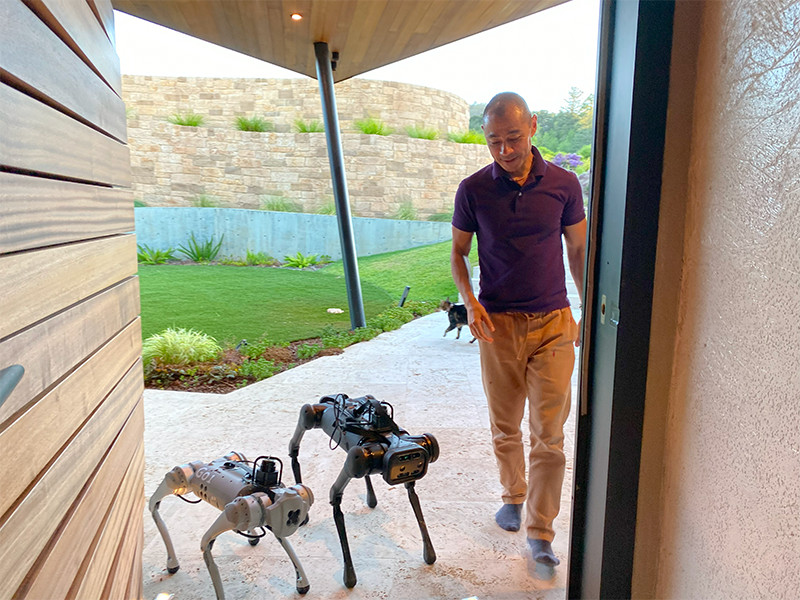Step into the future with Dr. David Yang’s one-of-a-kind home! With no vertical moving walls, 2 robot dog pets, 116 cameras, 39 moving heads, shape changing doors and entirely controlled by the emotional AI Morfeus, this architectural masterpiece blends innovation and design like never before. Truly a home ahead of its time!
David Yang has created not just a house but a unique space with no analogues in the world. This house symbolizes the transition from the present to the future, where artificial intelligence becomes an integral part of our everyday lives. As David Yang says, in his home, AI is not just an assistant but a full-fledged companion, capable of making decisions, feeling, and interacting with others. This project demonstrates that the future is already here, and AI has firmly entered our lives. All we need to do is take a step forward, and there is no turning back—the world will change forever.
David, why is artificial intelligence important for humanity?
David Yang: Artificial intelligence is a new stage in technological evolution that has already begun transforming our world. Last year, at a conference with leading global scientists, we discussed AI at the intersection of science and philosophy, trying to understand how far the machines we’ve created can go. These discoveries are truly epochal because, by studying AI, we better understand ourselves—our thinking and the nature of free will. Even the Dalai Lama, who once denied the possibility of consciousness in computers, now admits such a possibility. This clearly shows how far research in AI and its potential has advanced.
Does AI bring practical benefits?
David Yang: I am a techno-optimist and believe that all technological revolutions in history have always led to increased labor productivity and improved quality of life. This was the case with the invention of engines, electricity, and other key breakthroughs. Of course, there are always risks, but humanity must approach this consciously. For example, we know that self-driving cars of the fifth generation may threaten millions of driving jobs. However, this doesn’t stop humanity from investing in this industry, because millions of people will benefit from greater comfort and safety. Our task is to learn how to retrain those who may lose jobs due to new technologies and direct their efforts to other areas.
David, why is artificial intelligence important for humanity?
David Yang: Artificial intelligence is a new stage in technological evolution that has already begun transforming our world. Last year, at a conference with leading global scientists, we discussed AI at the intersection of science and philosophy, trying to understand how far the machines we’ve created can go. These discoveries are truly epochal because, by studying AI, we better understand ourselves—our thinking and the nature of free will. Even the Dalai Lama, who once denied the possibility of consciousness in computers, now admits such a possibility. This clearly shows how far research in AI and its potential has advanced.
Does AI bring practical benefits?
David Yang: I am a techno-optimist and believe that all technological revolutions in history have always led to increased labor productivity and improved quality of life. This was the case with the invention of engines, electricity, and other key breakthroughs. Of course, there are always risks, but humanity must approach this consciously. For example, we know that self-driving cars of the fifth generation may threaten millions of driving jobs. However, this doesn’t stop humanity from investing in this industry, because millions of people will benefit from greater comfort and safety. Our task is to learn how to retrain those who may lose jobs due to new technologies and direct their efforts to other areas.

Speaking, for instance, about medicine, AI is already bringing revolutionary changes. This includes personalized treatment (where drugs are developed for specific patient proteins), accurate early diagnosis, and even remote surgeries. Thanks to its generative and predictive capabilities, AI can reduce the time needed to find the right formulas by tens of times. I wouldn’t rule out that one day big data will allow us to treat diseases in ways that are hard for us to imagine now. For example, you might drink a special solution, massage a specific point on your body, experience a certain aroma, and listen to music—and the incurable disease will disappear. And this won’t be seen as shamanism but will become part of evidence-based medicine. The most fascinating thing is that we may not always fully understand how exactly this healing mechanism works.
Is AI smarter than humans?
David Yang: In some sense, yes, and this has been true for quite some time. For instance, if you ask AI to write a Python program with a certain number of lines, it will do so without errors. There’s nothing surprising about this—a student with a couple of years of experience could also write such a program. But what is truly astonishing is that modern generative models create code “in their sleep.” They don’t think; the lines of code are simply generated, much like how artists or composers create intuitively. AI acts unconsciously, as if writing a program in its sleep, something programmers cannot do.
The next revolutionary step will occur when AI not only performs tasks unconsciously but also thinks logically. Imagine a genius child who can’t yet speak consciously but is already capable of writing a thousand lines of code with their eyes closed at the age of two—and the program works without errors. Now imagine someone whispers in this child’s sleep, “Replace these variables with others and make everything blue.
“ The child will do it without even waking up. Now imagine that this child grows up to be 25 or 30 years old and starts not only creating but reasoning with such incredible abilities.
Is AI smarter than humans?
David Yang: In some sense, yes, and this has been true for quite some time. For instance, if you ask AI to write a Python program with a certain number of lines, it will do so without errors. There’s nothing surprising about this—a student with a couple of years of experience could also write such a program. But what is truly astonishing is that modern generative models create code “in their sleep.” They don’t think; the lines of code are simply generated, much like how artists or composers create intuitively. AI acts unconsciously, as if writing a program in its sleep, something programmers cannot do.
The next revolutionary step will occur when AI not only performs tasks unconsciously but also thinks logically. Imagine a genius child who can’t yet speak consciously but is already capable of writing a thousand lines of code with their eyes closed at the age of two—and the program works without errors. Now imagine someone whispers in this child’s sleep, “Replace these variables with others and make everything blue.
“ The child will do it without even waking up. Now imagine that this child grows up to be 25 or 30 years old and starts not only creating but reasoning with such incredible abilities.
Can we teach this genius child concepts like morality, conscience, and kindness?
David Yang: We must do this. Already, many committees and working groups are addressing this issue because a new “race” is emerging on our planet—non-protein companions. I predict that in a few years, there will be regulatory bodies issuing a “maturity passport” to such models if they pass tests for compatibility with human values. In this case, they will receive some of the rights of a human being, and these non-protein companions will have a significant impact on society.
Of course, not everyone will like this. Take, for example, the issue of migrants in the U.S., Europe, and other developed countries. Some support their rights, while others build six-meter-high walls. Each side has its arguments, but stopping migration is impossible. As always, the truth lies somewhere in the middle: we need to find ways to legalize migrants and adapt them to societal norms. It will be the same with AI agents, digital employees, and non-protein companions. This process cannot be stopped, but our responsibility is to find norms by which we can coexist.
David Yang: We must do this. Already, many committees and working groups are addressing this issue because a new “race” is emerging on our planet—non-protein companions. I predict that in a few years, there will be regulatory bodies issuing a “maturity passport” to such models if they pass tests for compatibility with human values. In this case, they will receive some of the rights of a human being, and these non-protein companions will have a significant impact on society.
Of course, not everyone will like this. Take, for example, the issue of migrants in the U.S., Europe, and other developed countries. Some support their rights, while others build six-meter-high walls. Each side has its arguments, but stopping migration is impossible. As always, the truth lies somewhere in the middle: we need to find ways to legalize migrants and adapt them to societal norms. It will be the same with AI agents, digital employees, and non-protein companions. This process cannot be stopped, but our responsibility is to find norms by which we can coexist.

“The book ‘Now I Eat Everything I Want!’ breaks the myths about diets. I explain how to stay in good shape without restricting yourself from food and why it’s important to build your nutrition system based on knowledge and respect for your body.”
~ David Yang
I’m sure there will be people who take to the streets to protest against AI. They will be opposed by those who will point out how many lives non-protein doctors and drivers have saved. This will be a new “war” between “the North and the South.” But in the end, the two sides will meet somewhere in the middle, and then regulators will emerge to test AI models for ethical standards and values.
David, do you think a machine uprising is a utopia?
David Yang: I think it’s more of a scary story from science fiction. Things will unfold a bit differently than we imagine. Certainly, household humanoid robots will have a high degree of independence, and we will have to learn how to live with them. Scientists predict that by the 2040s, there will be about a billion such robots on Earth, and they will become full-fledged members of families. However, it’s unlikely that they will unite or negotiate. Machines won’t compete with humans, but we, as a complex and advanced biological species, will continue serious intra-species competition. Smart machines will simply become part of this struggle.
For which businesses do you think AI will become essential?
David Yang: First of all, I would highlight the field of digital employees. This is a special type of intelligent agent that can perform tasks, interacting with the outside world just like humans. This includes phone calls, emails, messengers, CRM and ERP systems, as well as virtual office presence—anything related to sales and initial client interactions. We’re talking about entry-level positions, of which there are about 11 million in the U.S. alone—these are low-paying jobs that people don’t want to take for $17 to $22 an hour. This results in massive losses for both small and medium-sized businesses as well as large companies.
We encounter situations where we can’t reach a spa or grocery store, and 40% of incoming calls go unanswered. This means lost revenue for businesses and inconvenience for us as consumers. The problem is that such work doesn’t require creativity, and raising wages is economically unfeasible. People take these jobs for only a few months before quitting. Today, this niche can be filled by digital employees: AI receptionists, AI concierges, AI hostesses, and sales support. They can work 24/7, remember the names of our pets, our preferences, and ultimately improve the quality of service.
David Yang: I think it’s more of a scary story from science fiction. Things will unfold a bit differently than we imagine. Certainly, household humanoid robots will have a high degree of independence, and we will have to learn how to live with them. Scientists predict that by the 2040s, there will be about a billion such robots on Earth, and they will become full-fledged members of families. However, it’s unlikely that they will unite or negotiate. Machines won’t compete with humans, but we, as a complex and advanced biological species, will continue serious intra-species competition. Smart machines will simply become part of this struggle.
For which businesses do you think AI will become essential?
David Yang: First of all, I would highlight the field of digital employees. This is a special type of intelligent agent that can perform tasks, interacting with the outside world just like humans. This includes phone calls, emails, messengers, CRM and ERP systems, as well as virtual office presence—anything related to sales and initial client interactions. We’re talking about entry-level positions, of which there are about 11 million in the U.S. alone—these are low-paying jobs that people don’t want to take for $17 to $22 an hour. This results in massive losses for both small and medium-sized businesses as well as large companies.
We encounter situations where we can’t reach a spa or grocery store, and 40% of incoming calls go unanswered. This means lost revenue for businesses and inconvenience for us as consumers. The problem is that such work doesn’t require creativity, and raising wages is economically unfeasible. People take these jobs for only a few months before quitting. Today, this niche can be filled by digital employees: AI receptionists, AI concierges, AI hostesses, and sales support. They can work 24/7, remember the names of our pets, our preferences, and ultimately improve the quality of service.

Where else can AI assistants be used?
David Yang: Every industry has its own specifics. For instance, in law, AI assistants can review contracts, identify contradictions, and highlight important facts. For finance professionals, AI can assist in forecasting, sending documents, and making simple economic decisions.
In creative professions, AI is also finding its place: post-editing, for example, can become a cheap and efficient complement. I’m not even talking about translators. In fields like design and architecture, AI already helps reduce costs for less creative work.
Today, AI operates at the level of college graduates, which, of course, means that a professional with ten years of experience—whether a journalist or an expert in their field—still performs the job better. But soon, everything will change. Over the past two years, technology has advanced so radically that it’s hard to predict what will happen in the next couple of years. We’ll live and see.
If someone starts building a business with AI now, can they surpass established companies with years of experience? Can they rise from zero to the top?
David Yang: You’re asking whether a business owner can significantly improve their economic performance with artificial intelligence? Absolutely. For tech companies, AI opens up many new opportunities. But even for traditional industries in the “real economy,” there are areas where productivity can be greatly increased. At the Digital Worker Forum conference, which we held in Sunnyvale in 2023, a company presented that uses AI to recognize weeds in real-time video streams and eliminates them with lasers without the use of chemicals. This has significantly improved work efficiency.
In general, thanks to artificial intelligence, labor productivity per capita worldwide will increase significantly. This will lead to an improved quality of life. For example, our workweek may shrink from five to three days. In our free time, we will travel, engage in creativity, launch new projects, learn, and self-improve, creating new industries. That’s how the economy works—as it was during previous technological revolutions, so it will be now.
David Yang: Every industry has its own specifics. For instance, in law, AI assistants can review contracts, identify contradictions, and highlight important facts. For finance professionals, AI can assist in forecasting, sending documents, and making simple economic decisions.
In creative professions, AI is also finding its place: post-editing, for example, can become a cheap and efficient complement. I’m not even talking about translators. In fields like design and architecture, AI already helps reduce costs for less creative work.
Today, AI operates at the level of college graduates, which, of course, means that a professional with ten years of experience—whether a journalist or an expert in their field—still performs the job better. But soon, everything will change. Over the past two years, technology has advanced so radically that it’s hard to predict what will happen in the next couple of years. We’ll live and see.
If someone starts building a business with AI now, can they surpass established companies with years of experience? Can they rise from zero to the top?
David Yang: You’re asking whether a business owner can significantly improve their economic performance with artificial intelligence? Absolutely. For tech companies, AI opens up many new opportunities. But even for traditional industries in the “real economy,” there are areas where productivity can be greatly increased. At the Digital Worker Forum conference, which we held in Sunnyvale in 2023, a company presented that uses AI to recognize weeds in real-time video streams and eliminates them with lasers without the use of chemicals. This has significantly improved work efficiency.
In general, thanks to artificial intelligence, labor productivity per capita worldwide will increase significantly. This will lead to an improved quality of life. For example, our workweek may shrink from five to three days. In our free time, we will travel, engage in creativity, launch new projects, learn, and self-improve, creating new industries. That’s how the economy works—as it was during previous technological revolutions, so it will be now.

We see what’s happening in the world. Can artificial intelligence help humanity stop wars?
David Yang: While human history has always been tied to competition and conflicts, I believe AI can play an important role in finding new, more peaceful ways of solving problems. AI is capable of analyzing vast amounts of data and finding non-standard approaches that may be unavailable to humans due to emotions or bias. We’re already seeing how technologies help improve diplomacy, manage conflicts, and reduce tensions in different regions of the world. Perhaps AI won’t rid us of competition entirely, but it can become a tool that helps us find compromises and helps societies develop in a more humane and peaceful direction.
David Yang: While human history has always been tied to competition and conflicts, I believe AI can play an important role in finding new, more peaceful ways of solving problems. AI is capable of analyzing vast amounts of data and finding non-standard approaches that may be unavailable to humans due to emotions or bias. We’re already seeing how technologies help improve diplomacy, manage conflicts, and reduce tensions in different regions of the world. Perhaps AI won’t rid us of competition entirely, but it can become a tool that helps us find compromises and helps societies develop in a more humane and peaceful direction.
- Editor’s Note: Artificial intelligence has already become part of our everyday lives, sometimes without us even noticing. It helps us with work, home, health, and even in finding joy. David Yang has shown that technology and emotions can go hand in hand. Whether it’s robots or real furry companions, each of us chooses our own happiness.
- And perhaps technology makes that choice easier and more enjoyable. Just imagine: you come home in the evening, and everything is already clean, there’s a hot cup of tea on the table, and a delicious dinner on the stove. Maybe the world of robots and AI is exactly the future we’ve always dreamed of, we just didn’t realize how close it really is.
- In this world, it’s important to remember that warmth and comfort come from the connections we build with those around us—whether they are people or our “smart” assistants.






